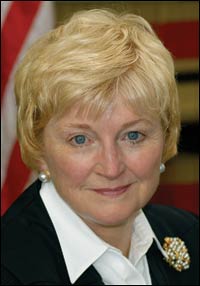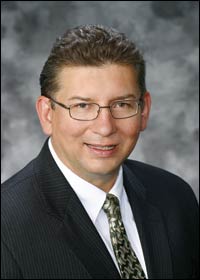Court extends rule for tribal transfers
By: Jack Zemlicka, [email protected]//October 22, 2010//

Discretionary transfer of civil cases of concurrent jurisdiction to tribal courts will continue for at least the next five years in Wisconsin.
In its review of 2008 statutory changes and 2009 amendments, the Wisconsin Supreme Court on Oct. 18 voted 5-1 to extend and revisit the process again in 2016. Justice Annette Kingsland Ziegler was not present for the vote.
While only a handful of cases have been transferred and no formal objections filed by parties, Justice Patience D. Roggensack reiterated opposition to the rule on the basis that it is unconstitutional.
She praised the work done by the tribal courts, but questioned the need for a rule that endorses nonconsensual transfers as well as the Supreme Court’s authority to alter an individual’s access to court.
“I continue to be shocked that our court would give its blessing to a rule that sends people against their will into a court that does not honor either the Wisconsin Constitution or the United States Constitution,” Roggensack said.
Justice David T. Prosser, who joined Roggensack in her initial 2008 dissent, agreed that there are constitutional concerns attached with the rule, but said at this point they are “theoretical.”
Litigants still have a right to appeal a transfer and until someone does, Prosser said it is hard to object to a process which appears to be working well.

Indian Law attorney John S. Swimmer agreed that at this point, the constitutionality of the rule is untested, although he expects that will change in the future.
“A constitutional issue I could see is if it were established that tribal courts were not providing due process,” he said.
But Swimmer also argued that conceptually, the process is no different than ordering binding arbitration in state court.
Outside of an increasing number of child support cases involving Oneida children that have been transferred from Brown County Circuit Court to the Oneida Nation, there have only been a handful of transfers throughout the 11 tribes in the state.
Swimmer said it will take time and familiarity to determine whether the rule is going to be beneficial long term.
“The biggest problem is that there isn’t any guidance for litigants or attorneys on the rule,” Swimmer said. “As these cases develop and there are challenges and appeals, I think the court will want to look at it again before it becomes a permanent rule.”
The discretionary transfer rule creating Wis. Stat. 801.54 was first adopted in 2008 by a vote of 4-3 and took effect in 2009.
The rule was amended last year, again by a 4-3 vote, to include a specific provision to facilitate transfers of certain post-judgment child support cases that are affiliated with federal IV-D programs, which provide assistance to states in establishing paternity and enforcing child support orders.
Jack Zemlicka can be reached at [email protected].
Legal News
- Former law enforcement praise state’s response brief in Steven Avery case
- Eric Toney announces re-election bid for Fond du Lac County District Attorney
- Former Wisconsin Democratic Rep. Peter Barca announces new bid for Congress
- Republicans file lawsuit challenging Evers’s partial vetoes to literacy bill
- More human remains believed those of missing woman wash up on Milwaukee Co. beach
- Vice President Harris returning to Wisconsin for third visit this year
- Wisconsin joins Feds, dozens of states to hold airlines accountable for bad behavior
- Trump ahead of Biden in new Marquette poll
- Bankruptcy court approves Milwaukee Marriott Downtown ‘business as usual’ motion
- New Crime Gun Intelligence Center to launch in Chicago
- Arrest warrant proposed for Minocqua Brewing owner who filed Lawsuit against Town of Minocqua
- Wisconsin Supreme Court justices question how much power Legislature should have
WLJ People
- Power 30 Personal Injury Attorneys – Russell Nicolet
- Power 30 Personal Injury Attorneys – Benjamin Nicolet
- Power 30 Personal Injury Attorneys – Dustin T. Woehl
- Power 30 Personal Injury Attorneys – Katherine Metzger
- Power 30 Personal Injury Attorneys – Joseph Ryan
- Power 30 Personal Injury Attorneys – James M. Ryan
- Power 30 Personal Injury Attorneys – Dana Wachs
- Power 30 Personal Injury Attorneys – Mark L. Thomsen
- Power 30 Personal Injury Attorneys – Matthew Lein
- Power 30 Personal Injury Attorneys – Jeffrey A. Pitman
- Power 30 Personal Injury Attorneys – William Pemberton
- Power 30 Personal Injury Attorneys – Howard S. Sicula











